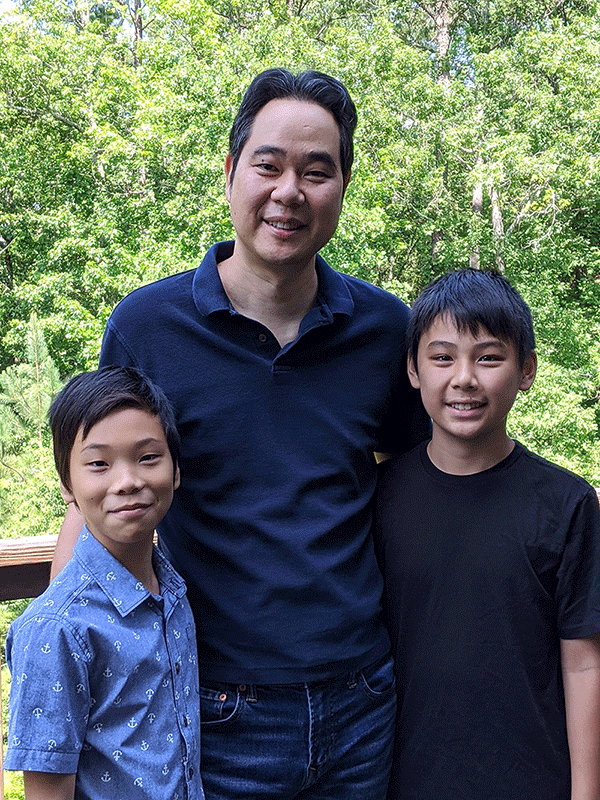Published August 4, 2020
Taka Saigusa, M.D., University of Alabama at Birmingham
How did you first get involved in PKD research?
 Taka: I worked as a clinician in Japan for quite some time before I got involved in research. My first exposure to PKD research was during nephrology fellowship training at the Medical University of South Carolina under the mentorship of Dr. Darwin Bell. He was studying the role of primary cilia in PKD. The PKD/cilia research was exciting, and I decided to pursue my career in this field. Hypertension is a common feature associated with PKD and I studied how primary cilia may affect blood pressure using PKD mice. Funded by a career development grant from the NIH, I continued my research at the University of Alabama at Birmingham.
Taka: I worked as a clinician in Japan for quite some time before I got involved in research. My first exposure to PKD research was during nephrology fellowship training at the Medical University of South Carolina under the mentorship of Dr. Darwin Bell. He was studying the role of primary cilia in PKD. The PKD/cilia research was exciting, and I decided to pursue my career in this field. Hypertension is a common feature associated with PKD and I studied how primary cilia may affect blood pressure using PKD mice. Funded by a career development grant from the NIH, I continued my research at the University of Alabama at Birmingham.
What are you working on currently?
Taka: I’m currently working on two projects. The first is to determine whether nano-sized particles can be used as a drug carrier to specifically deliver rapamycin (mTOR inhibitor) to mouse kidneys without being taken up by other organs. This method could deliver drugs to the kidney more efficiently, require lower drug dosing, and circumvent systemic adverse effects.
The second project is to determine whether factors that stimulate renal hypertrophy (enlarged kidney), such as consuming a high protein diet, increases mTOR pathway, activates immune cells, and accelerates cyst growth. I’m determining what components within the protein diet (plant-based versus animal-based protein) stimulates the immune system and accelerates cyst growth.
What would you like the patient community to know about your research?
Taka: There have been numerous efforts to elucidate the mechanism of how kidney cysts grow in PKD, but the treatment is still limited. Kidney-specific drug delivery could lead to broader implications for the treatment of PKD by testing known drugs that were effective in animal models of PKD but did not meet the criteria in clinical studies from either side effects or inadequate drug delivery to the cysts. In the renal hypertrophy project, if specific protein consumption can turn off the mTOR pathway without the use of a drug, this delivers a huge impact for PKD patients who require long-term treatment. Since clinical trials with mTOR inhibitors didn’t slow PKD progression in clinical trials.
Do you have a personal connection to PKD?
Taka: No personal connection, but I see PKD patients in the clinic at the University of Alabama at Birmingham. It’s a great opportunity to communicate with PKD patients, understand how they perceive the disease, and learn about the benefits and concerns they have from taking tolvaptan. I definitely feel the need for a drug that is safer and less symptomatic, especially for those who require long-term treatment.
What excites you most about this research?
Taka: I’m excited that both of my research projects could have a direct impact on patient care. A successful kidney-specific drug delivery that uses a lower drug dose could be safer for patients who require long-term treatment. If plant-based protein diet slows PKD, it would be clinically significant since recent plant-based meat development makes dietary protein modification feasible, safe, and doesn’t require dose restriction. This could lead to a meaningful dietary intervention that can immediately benefit particularly young patients who have early stages of PKD requiring long-term treatment.
What are some of your personal interests outside of research?
Taka: My hobby is playing the violin. Although I don’t play as much as I used to, I enjoy playing string quartets and chamber music. I hope someday I will be able to do that with my two sons who started learning the violin and the clarinet.
Check out Dr. Saigusa’s grant and others funded by the PKDF here!
The PKD Foundation is the largest private funder of PKD research in the U.S. Since 1982, we’ve invested over $50 million in more than 1,300 research, clinical and scientific grants, fellowships, and scientific meetings. Each year, the Foundation identifies and supports the work of scientists and researchers from around the world who look for ways to treat and eventually cure PKD. Our vision is to #endPKD. Donations fund necessary research that leads to more effective treatments and ultimately a cure for PKD.









0 Comments
Trackbacks/Pingbacks